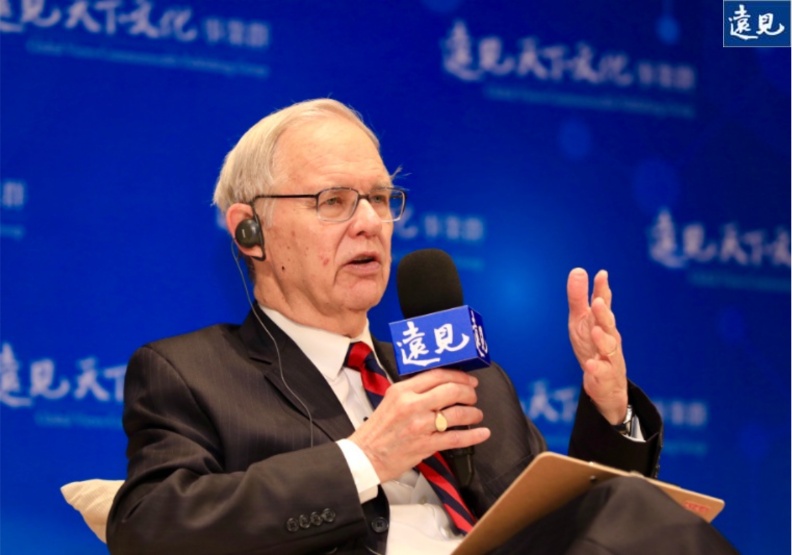2024年1月,中華民國就將選出新任總統,面對台海現狀詭譎、美中對抗態勢嚴峻,這位新任領導人要將台灣人民帶往何處?台海和平是否愈來愈不可得?國人對外在環境應該要有怎麼樣的認識?為此,遠見‧天下文化事業群特地邀請美國在台協會前理事主席卜睿哲(Richard Bush)訪台,於3月20日舉辦論壇,針對美中台三方關係發表專題演說,供讀者與執政者參考。
Point Number One: Many economies have reaped huge benefits from the globalization of manufacturing and the liberalization of trade, services, finance, and labor markets that accompanied it. In particular, the opening of the Mainland economy sustained growth in North America Europe, and East Asia, including Taiwan. A lot of companies made a lot of money, and many families became prosperous.
第一點:許多經濟體從製造業全球化和貿易、服務、金融和勞動力市場自由化中獲得了巨大的利益。特別是,中國大陸經濟的開放延續了北美、歐洲和東亞(包括台灣)的經濟成長,許多公司獲利甚豐,家家戶戶變得富裕。
In Taiwan’s case, this process began in the early 1990s at the earliest. Companies benefited enormously from access to the Mainland consumers and the freedom to relocate operations to places like Dongguan and Kunshan. Some Taiwan companies became critical links in global supply chains. When President Ma came into office, he wanted to ensure that Taiwan kept up with other economies, so he removed obstacles to cross-Strait business and sought to create a free-trade zone or common market with China.
就台灣來說,這個過程最早始於1990年代初期。台企獲益匪淺,不論是接觸中國大陸消費者,或是遷移到東莞和昆山等地的經營。部分台灣公司成為全球供應鏈中的關鍵環節。馬總統上任後,他想確保台灣跟上其他經濟體的步伐,因此他消除了兩岸商業障礙,並尋求與中國洽談自由貿易區或共同市場。
Point Number Two: Globalization and liberalization are massively disruptive. They create winners and losers. It’s what Joseph Schumpeter called creative destruction. In a globalized economy¸ every country hopes that creation will exceed the destruction, but that doesn’t always happen.
第二點:全球化和自由化有極大的破壞性。它們創造贏家和輸家。這就是熊彼得所說的「創造性破壞」。在全球化的經濟中,每個國家都希望創造會超過破壞,但並不一定如願。
Point Number Three: Globalization and liberalization can create domestic political tensions in the economies that lose jobs as a result. Donald Trump may have been ignorant of the basics of international trade, but he shrewdly recognized the economic and psychological distress that trade with China created in many parts of America. He won the 2016 election in part by cleverly manipulating that distress.
第三點:全球化和自由化可能在失業率高升的經濟體中製造政治緊張,川普可能對國際貿易的基本原理一無所知,但他狡猾地認識到中美貿易在美國許多地方造成的經濟和心理困擾。因此,他在2016年的選舉中巧妙地操縱了這種情緒。
Point Number Four. A globalized economy is dynamic and always changing. Economies and companies must always adjust to changing circumstances.
第四點:全球化經濟是動態的,總是在不斷變化。各個經濟體系和公司必須適應不斷變化的情況。
As you know better than I, the Mainland economy has evolved time. Both state-owned and private companies have become more competitive and seek to move up the value chain, a trend that was to be expected. Also, as a result of changes in PRC government policies, the business environment changed for the worse non-state firms, both domestic and external. One might ask, is China de-globalizing to an extent? In this environment, therefore, each Taiwan company on the Mainland is having to assess the balance between risks and rewards and adapt accordingly.
在場的大家比我更了解,中國大陸經濟已演變很長一段時間。無論是國有企業還是民營企業,都更具競爭力,並尋求向價值鏈上游發展,這是可預料的趨勢。此外,由於中國政策的變化,對國內外的非國有企業來說,商業環境變得更加惡劣。因此,人們可能會問,中國正在進行某種程度的去全球化嗎?在這種環境下,每家臺灣企業在中國大陸都必須評估風險和報酬間的平衡,相應地進行調整。
Point Number Five: Globalization often gets blamed for problems that are caused by a totally different factor: technological change. This is a parallel process and different kind of creative destruction, one that also produces winners and losers. In many economic sectors, jobs are lost or disappear altogether not because of China’s economic advantages but because smart people create revolutionary ways to make better products and increase productivity.
第五點:全球化常遭指責引發問題,只因一個完全不相干的因素:技術變革。這是一個平行過程以及不同種類的創造性破壞,同樣能產生贏家和輸家。在許多經濟行業,工作職位的消失或完全消失,往往不是因為中國經濟優勢,而是聰明人創造了革命性的方法製造更好的產品、提高生產力。
So, at a corporate level, companies need to constantly improve its core technologies, because other companies will be catching up. At the level of the individual employee, the key question is whether employees have the skills that innovating companies need and upgrade their skills as technology changes. Do governments see a responsibility to provide mid-career skills training, re-training that meets the needs of employers? I can tell you that the United States has done a terrible job on this task.
因此,在企業層面上,公司需要不斷改進核心技術,因為其他公司也在追趕。在員工個人層面上,關鍵問題是員工是否擁有創新企業需要的技能,並隨技術變遷而升級技能。政府是否有責任提供符合雇主需求職涯中期技能培訓和再培訓?我可以告訴大家,美國在這方面做得很糟。
Point Number Six: Globalization and technology can come into conflict. At the corporate level, if entities at the lower end of a global supply chain steal the technology of entities at a higher level, the companies that are the targets of theft may need to reduce their level of globalization to ensure their survival. At the national security level, if one country uses advanced semiconductors produced in another economy to significantly improve its military capabilities and thereby put the supplying country at greater risk, then perhaps trade in those chips needs to be controlled.
第六點:全球化和科技可能會發生衝突。在企業層面上,如果全球供應鏈下層的企業竊取了上層企業的技術,被竊取技術的公司可能需要降低全球化程度以確保生存。在國家安全層面上,如果A國使用在B國生產的先進半導體來提高軍事能力,讓B國處於更大的風險之中,那麼對於晶片的買賣就必須進行管制。
As you understand better than I, the two forces of globalization and technological change have been very controversial, because they create losers as well as winners. It is hard to keep winning and also support the losers – whether they are companies or individuals – against forces over which they have no control. It is also difficult to balance economic opportunities with security imperatives.
大家比我更了解,全球化和技術變革這兩股力量極具爭議性,因為它們創造了贏家和輸家。無論公司還是個人,很難在保持領先優勢的同時,還繼續支持輸家,因為贏家無法控制這些力量。在經濟機會和安全要求間取得平衡,也很困難。
These trends have had a unique impact on Taiwan. Closer economic integration with the Mainland led some people here to worry that if Mainland economic power increased its presence in the Taiwan economy, it would put Taiwan on a slippery slope towards some kind of political incorporation. They also feared that the institutions of Taiwan’s representative democracy were not sufficiently vigilant about the Mainland threat.
這些趨勢對台灣產生了獨特的影響。與中國大陸更緊密的經濟一體化讓部分人擔憂,如果中國大陸經濟實力在台灣經濟中的比例增加,會把台灣推向某種形式的政治合併滑坡。這些人也擔心,台灣代議民主對於中國大陸的威脅警覺性不夠高。
These worries were so serious that some political activists mobilized a number of efforts to circumvent the core institutions of Taiwan’s democratic system. These include the growth of a protest culture, of which the Sunflower Movement was the most prominent example. In addition, there was the use of referendums to challenge the ruling party’s policies. At least temporarily, populist sentiments spread through society.
這些擔憂是如此嚴重,以至於部分政治激進份子使盡氣力,規避台灣民主制度的核心機構。包括抗議文化的成長,其中以太陽花學運最為突出。此外,也使用公投挑戰執政黨的政策。至少現在,民粹主義情緒仍在台灣社會中蔓延。
Note again the way that political forces like the Sunflower Movement can block what they oppose but they make it harder to foster a broad policy consensus that serves Taiwan’s best interests. In that case, one result was that nine years later, there still is no agreed-upon mechanism to approve economic agreements that might be reached with the Mainland, even if they are clearly in Taiwan’s interests.
像太陽花學運這樣的政治勢力可以阻止他們反對的事情,但他們卻讓塑造符合台灣最佳利益的政策廣泛共識,變得更加困難。在那種情況下,其中一個結果就是九年後的今天,就算明顯符合利益,台灣仍然沒有協議機制來批准與中國大陸可能達成的經濟協議。
Evolving globalization and relentless technological change have created a more fundamental problem, I believe. Taiwan, it seems, has a dual economy. On the one hand, there is the very successful, globalized, high-tech sector. On the other, there is the sector of small and medium-sized industries. Some SMEs, of course are linked to Taiwan’s most globalized companies and do very well. Others have only low productivity and cater to very small markets.
我認為,在不斷進化的全球化以及不間斷技術變革的帶動下,已然創造一個更根本性的問題。看起來,台灣擁有經濟雙重性。一方面,存在著非常成功且全球化的高科技企業。另一方面,也存在著中小型企業。當然,部分中小企業與台灣最全球化的公司有連結(?),而且做得非常好。其他中小企業只有很低的生產力,服務於非常小眾的市場。
Linked to economic duality is the conflict between growth and equity. During the last three decades, in which integration with the Mainland market sustained Taiwan’s economic growth, inequality has increased. In 1991, the average disposable income of the top 20 percent of households was five times greater than the lowest twenty percent. Now it is over six times. The wealth gap is probably greater.
與經濟雙重性相關的是經濟成長和公平間的衝突。在過去三十年間,與中國大陸市場的融合支撐了台灣的經濟成長,但財富不均程度也增加了。1991年,台灣最富裕的前20%家庭平均可支配收入,是最貧困20%家庭的五倍。現在這個差距已逾六倍,財富差距可能還更大。
Taiwan’s aged society creates a related set of problems. The work force is declining in size relative to that of the older generations it must support. Young people are quite reluctant to get married because many of them can’t get good jobs. In 2021, the unemployment rate for people 35 years old and older was less than 3 percent. For people 25 to 29 it was 6.6 percent and for those 20 to 24 it was 12.5 percent. Unemployment was highest for those with a university degree.
台灣高齡化社會帶來一系列相關問題。相對於需要支援的老年人口,勞動人口正在減少。由於許多年輕人找不到好工作,他們不太願意結婚。2021年,35歲以上人口的失業率不到3%,25至29歲的失業率為6.6%,20至24歲的失業率為12.5%。擁有大學學位的人失業率最高。
As a matter of equity, reducing the inequality gap should be a priority. I know from my own country that this is not easy to do. The factors involved include policies to sustain economic competitiveness, the level of taxation, how the tax burden is distributed, the scope and quality of the educational system, the dynamics of the housing market, the design of pension and health care systems and how well they are funded.
從公平的角度來看,縮小貧富差距應該是重要的優先處理事項。我知道,從美國來看,這並不容易。涉及的因素包括維持經濟競爭力的政策、稅收基準、稅負分配方式、教育系統的範圍和品質、房市的動態、退休金和健保系統的設計,以及資金是否準備充裕。
At the end of the day, it comes down to the ability of the political system to create a balance among these various factors, and to do so in a sustainable way. That in turn, I believe, depends on the willingness of the two major political parties to agree that a fair society is a stronger society, and to create a policy consensus to make it possible. I would note, by the way, that all these factors exist in the United States, and our political system is doing a bad job of addressing them.
追根究底,這取決於政治體系在前述各種因素間維持平衡的能力,並以永續的方式實現。我相信,這反過來又取決於台灣兩大主要政黨是否願意同意,公平社會才是強大的社會,同時達成政策共識,使之成為可能。順帶一提,這些因素在美國也存在,而我們的政治體系在解決這些問題方面做得很糟糕。
On Cross-Strait Relations
Let me turn now to the policy issue that creates the greatest political debate here. That is cross-Strait relations. I could do a whole lecture on the politics of cross-Strait relations, but I’m sure that you don’t want me to talk for the next two hours, so I will make a couple of basic points.
關於兩岸關係
現在讓我談談在這裡引起最大政治爭辯的政策議題,也就是兩岸關係。我可以開設完整的講座來談論兩岸關係中的政治議題,但我相信你們不會想讓我講兩個小時,所以我只談幾個基本觀點。
First of all, one reason this is such a divisive issue is that it is a really difficult issue to resolve. If it were easy, it would have been resolved a long time ago.
首先,這個議題會如此引起爭議的原因之一,乃因這是一個難以解決的問題。如果這問題容易解決,它早就被解決了。
To simplify radically, there are essentially two policy approaches. The first is reassurance of and engagement with the Mainland. The second is fearful vigilance and deterrence. The first has been the option favored by the KMT since 2005. The second has been the option favored by the DPP for as long or longer.
極度簡化來說,基本上台灣有兩種政策取向。第一種是對中國大陸的安撫和接觸,第二種是出自恐懼的警覺和嚇阻。自2005年以來,第一種選項一直是國民黨的首選。第二種選項已是民進黨的首選。
In my view, the question is not choosing between engagement and deterrence but figuring how to balance and integrate the two. I am sure all smart people in Taiwan have no illusions that this balancing and integration will be easy.
在我看來,問題不在於選擇接觸或嚇阻,而在於如何平衡和整合兩者。我相信,在台灣所有明智的人都不抱幻想,認為這種平衡和整合是容易的。













